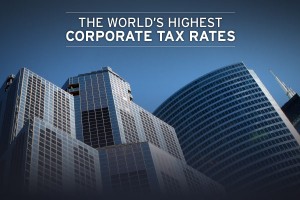(ThyBlackMan.com) I earned my undergraduate degree in tax accounting from Oral Roberts University (ORU). Upon graduation, I spent a decade working in tax accounting, both for government and the private sector.
So, in this week’s column, I want to take advantage of my education and training to write about tax law. Let me start by giving the example of how our welfare state has crippled our economy and destroyed the family unit.
Back in the day, if a girl was on welfare, she could not be married or have a male living in the house. If the girl was discovered to be in violation of these rules, she was immediately removed from the welfare rolls, even if that meant hurting her children.
So, in a perverse way, the government was rewarding single motherhood and discouraging marriage with their policy. In simple economics, if you tax (or penalize) something (marriage), you get less of it. If you reward something, you get more of it (fewer single mothers and more marriage).
In a similar manner, governments reward and punish corporations and entrepreneurs by the way they tax earnings. Some industries are more sensitive (elastic) to changes in the tax code than others (inelastic).
You raise taxes on cigarettes and sales will not drop because those who smoke are addicted and they will always find a way to get their next smoke (inelasticity—their behavior is not sensitive to price). But if you raise taxes on sodas, sales will decrease because it is considered a discretionary purchase (elastic—they can buy a cheaper fruit drink, they are very sensitive to price).
Currently, our economy is anemic in its growth, unemployment is still above 7 percent, and job creation is almost nonexistent; but just imagine if someone magically injected more than $ 2 trillion into our economy. What would happen?
Well, you don’t have to imagine this scenario because Obama and the Congress can make this a reality.
As in my earlier example, the more of something you have, the cheaper it becomes. So, if the U.S. economy is infused with $ 2 trillion, banks would have more and cheaper money to loan to small businesses (who are the biggest job creators in our economy); these businesses would hire more people; as more people begin to work, they will spend more money in our economy; thereby increasing our gross domestic product (GDP). The beginning of a growing economy.
Recently Bloomberg News analyzed the security filings of 307 multinational companies headquartered in the U.S. Bloomberg estimated that these companies have almost $ 2 trillion sitting in offshore accounts (all legal based on current tax law). Their offshore companies pay taxes in the country they operate in and those taxes are deducted from their U.S. taxes.
But they don’t pay U.S. taxes on their foreign profits until they bring the money into the U.S. The current tax rate for foreign income is now 35 percent, one of the highest in the world (along with China and South Korea).
So, companies are docking their profits in countries like Ireland, whose tax rate is 12.5 percent; or Bermuda whose rate is 0 percent.
According to the Congressional Research Service estimates, giving incentives for these corporations to repatriate their profits back to the U.S. would generate an additional $30-$90 billion in tax revenues.
But why pay a 35 percent tax rate to bring money into the U.S. when you can borrow money at 5 percent to expand your foreign operations; plus the interest you pay on the loan is deductible as an expense on your U.S. tax return. In essence, you are making interest on the money you will eventually have to pay U.S. taxes on. Defacto, the U.S. government is giving these corporations interest free money to play with.
Chairman of the U.S. House’s Ways and Means Committee, Dave Camp (R-MI) submitted a bill last month that would reduce the corporate tax rate from the current 35 percent down to 25 percent); unfortunately, it has absolutely no chance to pass in an election year.
Camp’s bill is a good starting point. I think consensus can be reached to lower the corporate tax rate to 25 percent in order to get companies to repatriate some of their profits back to the U.S. I would mandate that the new revenue be earmarked for an infrastructure fund that can only be used to repair our bridges, roads, etc.
This would create jobs and fix up our deteriorating infrastructure at the same time. I think both parties can agree on this.
Staff Writer; Raynard Jackson
Mr. Jackson is also founder of a political and industrial consultant firm which is based in Washington, DC; Raynard Jackson & Associates.

















A very good argument can be made that maintaining a “tight” monetary system keeps interest rates low and in turn brings more value to the dollar. And while an infusion of money into our economy is a good thing, there needs to be safeguards set in place to prevent runaway inflation (which comes as a result of a weakly valued dollar.) What would you consider an acceptable rate on corporate taxes to be? Neither Ireland nor Bermuda deal with the same economies of scale that the United States does so I don’t think either of those are practical models to use.
I believe the tax code should better reward large corporations who reinvest their profits back into this country. These rewards should come in the form of tax credits instead of the heavy handed and punitive tax code they currently have to navigate.
Oh, and by the way, I believe that a tax rate of 10% is practical, affordable and beneficial.